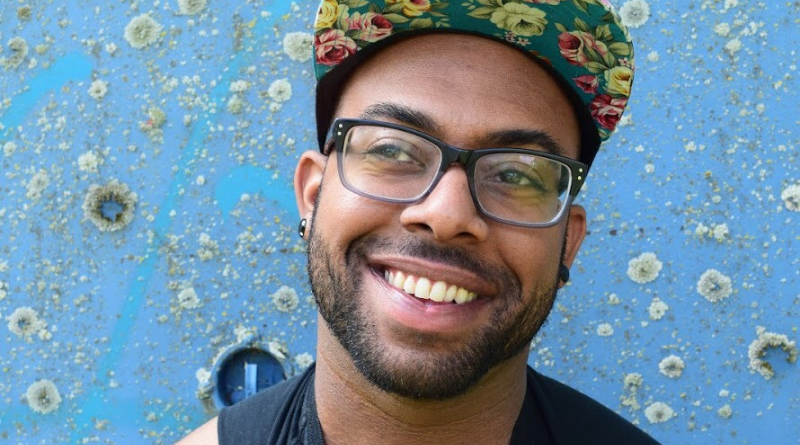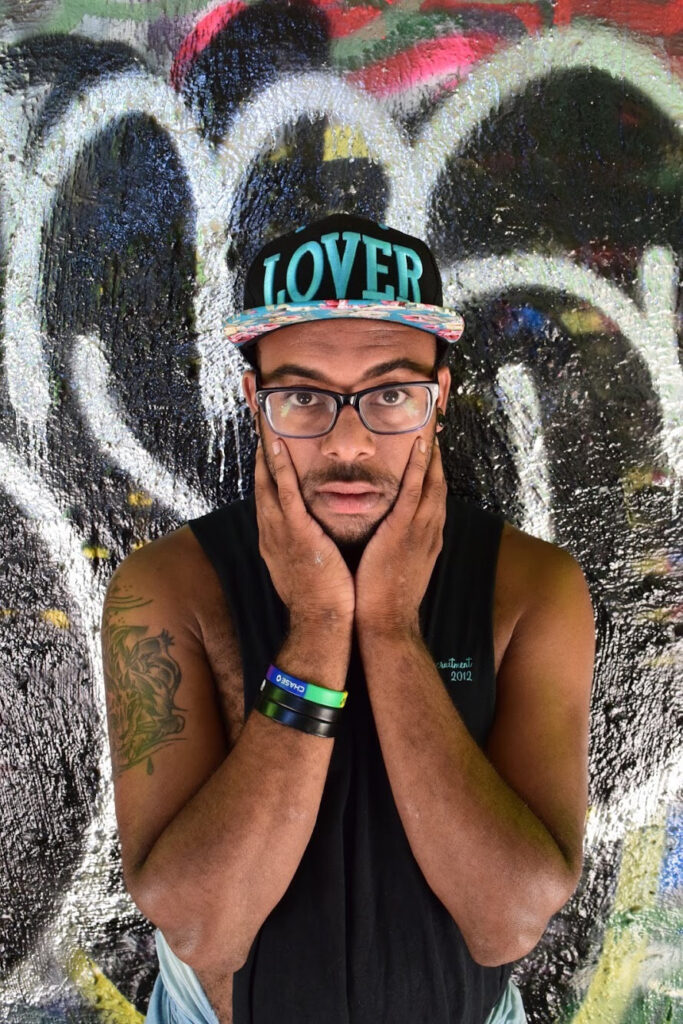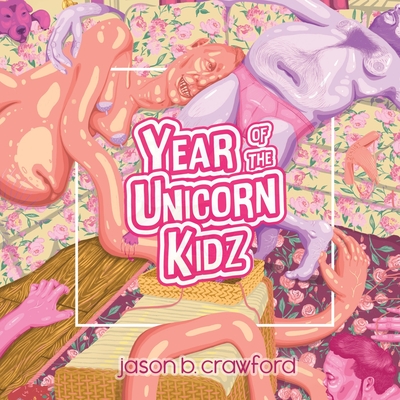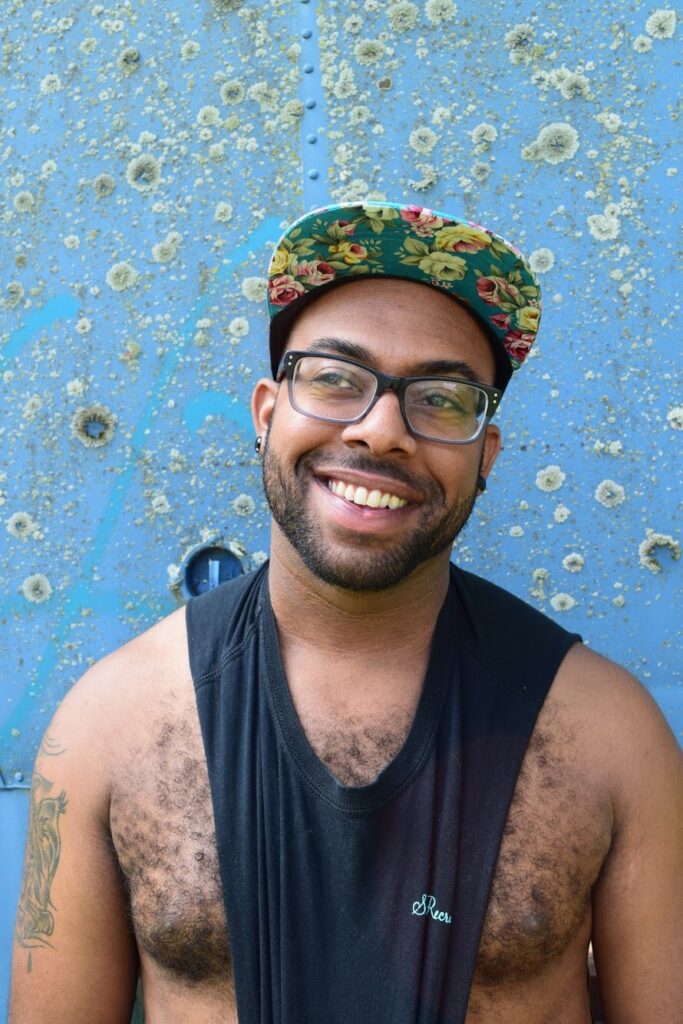
The Poetry of jason b. crawford
The bear community is filled with such wonderfully talented and creative people. One of the joys of editing the magazine is to be able to converse with these artists and bring their stories to you, our readers. Allow me to introduce you to jason b. crawford.
jason b. crawford (they/he/she) is a phenomenally talented poet who was born in Washington DC, but raised in Lansing, Michigan. They graduated Eastern Michigan University with a Bachelor’s in Creative Writing and hold an MFA in Poetry from The New School. A highly decorated writer, jason is a 2023 Lambda Literary Emerging LGBTQ Voices fellow. They are also the winner of the Courtney Valentine Prize for Outstanding Work by a Millennial Artist, and the winner of the Rhino’s Founders Prize, just to name a few.

Their debut full length book Year of the Unicorn Kidz is currently available from Sundress Publications and will be followed up by a second collection of work entitled YEET! To be published in 2025. Their poetry has been published in Poetry Magazine, Metro Weekly, Cincinnati Review, Frontier Magazine and many, many others. I am thrilled to add Bear World Magazine to that esteemed list of publications, as jason was generous enough to give me an unpublished piece of theirs to run in this article:
love poem (2/x)
Blessed love I do not know
how (who) to name; I keep returning
to many brightly silk garments in my other poems, in some way
to search for ways of describing you; delicate beast yet firm eyed, a soft
sandstorm. Sometimes you are all I want,
sometimes you are all I want (dead) I guess
that is just the politics of love (loss) I’m stubborn, you know;
to admit this; but I see the ghost
of you everywhere. So much water filling your throat; your body
hanging from the railroad tracks, i am so afraid of keeping you
alive (around) Bird chest boi, how do I say
I love you without signing your life away? In my arms,
you are not safe from what might hurt (heal) you. Sometimes,
I think of you dying and all I can do
is laugh. I’m horribly funny; my sense of humor; a catastrophe
I can’t possibly keep to myself.
And now I am proud to present the conversation I had with this gifted artist below.

John Hernandez (JH): Hi jason! I’m thrilled to be talking with you. I love your work. When did you discover your gift for writing poetry?
Jason b. crawford (jbc): Honestly? In undergrad. I started as an elementary education major, double majored in math for most of my college career. Some small events happened (nothing major, just classes I didn’t like) and I switched over to the creative writing major for fiction. I used to write stories with my grandma when I was younger but none of them ever were finished. When I was in the program, my advisor really pushed me towards poetry, noticing my potential from the class I had taken. After a semester or so, I decided I wanted to be a poet. I will say however, when I was about 11, I was a “songwriter,” I wanted to be a singer. The songs weren’t terribly good but it helped me have a foundation for writing.
JH: I can definitely see that paving the way for your future writing career. While I have not read all of your work, the work I have read beautifully describes the anguish, frustration and longing you have experienced. Where do you find the words to articulate such enormous concepts?
jbc: I call myself a speculative poet. Not everything in my poems have happened to me, in fact most has not. That comes from my fiction background. My mind, ever since I was a child, has been an elaborate field; creating scenarios in my head of what-ifs. I have millions of outcomes playing all at the same time (sometimes for better or worse). Secondly, my poetics come from a sense of wonderment and looking. I have never been able to keep up with all the historical data but I have been able to remember small details I notice about a flower. When I wander around the world, I am picking up small details that I can in turn apply to my poetics. By using both of these methods, I am able to put myself in the shoes of others, of animals, of flowers, of buildings, all to ask how they felt in a moment. Of course, my life is not without strife, but I choose to offer the points of others, not just my own. I am a vessel for poems, not just the navigator.
JH: Interesting choice of words. So then, what inspires your poetry? Does it come spontaneously, or do you sit and have writing sessions?
jbc: My writing practice is very spontaneous, I can sit and decide to write, but often I would rather write in the wild after experiencing. That comes from the practice of noticing. If I’m watching how a building is curved like the back of a man, I’ll want to explore that image as I think of it, often using my notes app or Google docs in my phone. I then will return to these images or small drafts to create the first draft from my computer. That is my sit-down process, at the computer after I’ve collected the notes. I do not knock scheduled writers; I just am not a very scheduled person when it comes to my craft. Often at readings, I cannot even come to the event with a set list of poems to read.
JH: Wow! I am too type A I think for that. I thrive on planning things as much as I can hahaha! Tell us about “Impact of Return” which was published in Frontier Magazine. I think everyone should read this piece! I was absolutely bowled over. Can you discuss the subject matter and structure of the poem.
jbc: Oh thank you! I am thrilled you enjoyed that poem. I have a new book that just won the Omnidawn 1st/2nd Book Prize called YEET! which will be published in 2025 where this poem will appear. To understand the poem, I’d say you’d need to understand the manuscript, this poem is quite late in the book. I wanted to create an alternate reality where Black people left earth in search of a freer planet to loosely quote Danez Smith. The concept was to question, what does Blackness look like when it is not swallowed by whiteness? I don’t believe I came to that answer but I can say my manuscript toes the line of wanting to be free and understanding what it means to build that freedom. “Impact of Return” is the penultimate of this ideal, I wanted to write a poem about leaving, what we left, and why we never return. The form is called a palindrome, a style of poetry that dates back to the Roman civilization. It is a poem that can be read forwards or backwards. I wrote the forward piece as us leaving earth “officially” and the backwards piece as us contemplating coming home but refusing. The violence towards Black people in america and the world fuels enough of our poems, what happens if we aren’t here for them to hate us.

JH: Your latest published book was Year of the Unicorn Kidz. What is the collection about and how does it differ from your other work?
jbc: YOTUK is a fun book! I honestly did a 30 for 30 in June of 2020 (write a poem each day for 30 days) in which each poem I wrote was a form poem. This was in the wake of the Floyd murder, I was sure the work I would be doing would be heavy Black work. My grief (and absence of touch due to the pandemic and because I had just broken up with my boyfriend) forced me to write cruising poems. The poems weren’t just about sex, they started to question safety. How safe was I in the wild? I came to the conclusion that even in sex, in when we are desired, we are also in danger. My first two chapbooks (small books that comprise a full collection like YOTUK) focused a lot on Blackness and death, then Blackness and dance. This was a chance to talk about my queerness and my fear of being queer in the world, something I rarely show. (The fear, that is, i’m bisexual / gay as hell!)
JH: How does being a trans identifying person of color impact your writing and world view?
jbc: Majorly, I am a masc presenting bearish trans person. People assume I am a man all the time. This morning, a Black stud called me sir. And I get it, I was in a SnapBack and an X-Men sweatshirt and sweatpants (always grey). I looked masculine, I am not presenting queer, but that doesn’t change my queerness. I’ve had people I was interested in tell me I wasn’t nonbinary enough to be nonbinary. I have a beard and I look like a dude. More so, the trans identity is often most accepted when it is a white transman. They are truly the only ones that can potentially gain something politically during transition. Trans POCs are still POCs at the end of the day no matter our gender. It is important for all queer people to help and uplift all trans people in order for us to reach equity.
JH: Absolutely. And, do you identify with the bear community and how does that impact your work? What is your experience with the community?
jbc: I am a bear ride or die. Mostly. I cannot say I have written many bear poems, minus my ode to BearMilk that is coming out soon from The Journal (and will also be in YEET!), but I do love the community. My best friends are bears, I’m a bearish person. But it is also important to note and understand the divide within the bear community. There have been times I have felt less than due to my Blackness or my size. Desire is a preference, inclusivity is not. I enjoy places where people make me feel welcome, places like Georgiz in Toledo, Hayloft in Detroit, RockBar in Manhattan, etc.. This is my community, the ones that care about me past the size in my pants.

JH: “Desire is a preference, inclusivity is not”. I LOVE that statement. Where can readers find you on social media and where can we read your work?
jbc: All my social media is @jasonbcrawford and my website is jasonbcrawford.com. Please feel free to follow and read some poems. If you see me at a bar in the city come say hi!
JH: And is there anything we have not covered that you’d like to mention?
jbc: Thank you for the generous questions and wanting to hear from me. This means the world to me that Bear World Magazine would want to talk with me at all! I am a huge fan!
JH: We’ve been fans of your work for a long time! Thank YOU for taking the time to chat with us. Big hugs!
